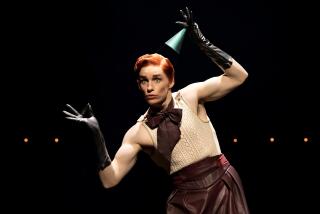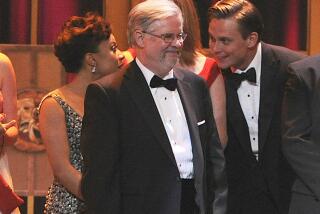Druid Theatre draws peasant life in the raw at UCLA Live
The plays of John Millington Synge may have more rustic charm than a bed-and-breakfast brochure from the Irish tourist board, but don’t be fooled by their picturesque settings and lyrical lilt. Tragic, comic or some blithe hybrid, they have a way of telling audiences uncomfortable truths -- usually about the raging cowardice of ordinary men and the strong, sex-starved women who are stuck with them.
The Druid Theatre Company has been touring its Synge cycle -- all six plays served up marathon-style -- to wide-ranging acclaim. And as part of its seventh International Theatre Festival, UCLA Live has imported two of the productions -- “The Shadow of the Glen” and “Playboy of the Western World” -- for a double bill that runs through Saturday at the Freud Playhouse.
Lucidly delineated if a tad rushed in patches, Garry Hynes’ confident stagings provide a rich encounter with one of Ireland’s most beloved dramatists. The accents may cry out for supertitles (sorry guys, you’re on your own), and the glossary of terms in the playbill may not be enough to unlock the meaning of every folksy line, but the poetry comes through like a song that blazes into your heart despite its often obscure lyrics.
Forever linked with the Aran Islands, where Yeats sent him to discover ancestral inspiration, Synge died just shy of his 38th birthday in 1909. But he managed to leave behind a small treasure-trove of dramatic gems, including a comedy that has a claim to being one of the greatest of the 20th century.
I’m speaking, of course, of “Playboy,” which is really a moonlit fable unfurling in carnivalesque sprawl. “Shadow,” the curtain raiser, is shorter and more somber, yet one can detect the same wind howling through its theatrical branches.
Both plays spotlight forlorn women living on the dark, rain-lashed edge of civilization; both take place in bare-bones interiors that offer little more than a membrane-like shelter from the fearsome outside; and both reawaken the supposedly dead to rile the living.
When “Playboy” premiered at Dublin’s Abbey Theatre in 1907, riots infamously erupted. The outrage was ostensibly over the word “shifts,” but it was more than the mention of female undergarments that transformed the audience into a mob.
Ever alert to the moralizing hypocrisy of calcified public opinion, Synge refused to idealize his characters for the sake of the nationalist crusade. Such an idea went against the marrow of his values and beliefs, which held that through years of English domination, the native instincts of the Irish people were betrayed by pious fears and an ineffectual longing for a homeland savior.
“Playboy” revolves around Christy Mahon (Simon Boyle), a galumphing young man who believes he has knocked his tyrannical father into the grave. On the lam from the “searching law,” he becomes a hero to the impressionable Mayo villagers, who find in his crime a species of bravery they could badly use in their own lives.
The townsmen tend to be either dependent on spirits or the preaching of over-controlling priests, but Synge also draws for us two women who possess a defiant freedom and the brute force needed to defend it.
Pegeen Mike (Sarah-Jane Drummey), dutifully tending to her father’s bar, is a fiery lass of marriageable age who may not have much hope for happiness but is prepared to lay anyone flat who attempts to saddle her with the usual Mayo misery. And Widow Quin (Catherine Walsh), a stark image of the disappointed woman Pegeen is likely to age into, might have everyone whispering about the suspicious circumstances of her husband’s death, but for all her sepulchral sauciness, she’s still firmly on the side of life.
“Playboy” has been variously interpreted as a revised version of the Oedipus myth and, more recently, as a post-colonial allegory, in which a nation’s identity moves from oppression through hyperbolic patriotism to an assumption of courageous self-determination. But the play’s power rests in its refusal to be pinned down by any single interpretation, and its reach stretches beyond one country’s history to map out the struggle of the individual seeking autonomous escape from society’s chokehold.
It needs to be said, however, that this is not the same ensemble that was lavished with praise in New York in 2006 for its deft seamlessness and earthy grace. The broadness of some of the acting in this recast touring production is to be expected when local color plays such an important role. But what was slightly disappointing was the skimping on internal specificity, the soft pauses and quiet stares in which crucial moments can register on the characters’ souls.
The plays are inherently moving, and the clarity with which they’re animated is appreciated. But sometimes the outlines are too briskly drawn, and one wishes there was more time to linger silently in the cracks of the crises and their devastating aftermaths.
In “Shadow,” the situation of Nora Burke (Walsh again) seems to happen at a rate too rapid for her emotions to keep pace. The tale of a wife who has made a Faustian bargain for her material security by marrying an old despot who punishes her relentlessly for her choice fails to become personal. There’s a storybook quality to the homeless gent (Peter Gowen) who leads the woman away from her once cozy, now unwelcoming prison to a frighteningly penurious independence.
Curiously, it’s Nora’s wrathful husband (Tom Hickey) -- cadaverous at the start, boiling with venom toward the end -- who seems more real than anyone onstage. But then as always with Synge, it’s from the bloody gashes that the poetry of prosaic life flows.
Druid Theatre Company, UCLA’s Freud Playhouse, Westwood. 8 p.m. Wednesday through Saturday; tickets $36 and $50. (310) 825-2101 or www.uclalive.org. Running time: 2 hours, 45 minutes.
More to Read
The biggest entertainment stories
Get our big stories about Hollywood, film, television, music, arts, culture and more right in your inbox as soon as they publish.
You may occasionally receive promotional content from the Los Angeles Times.







